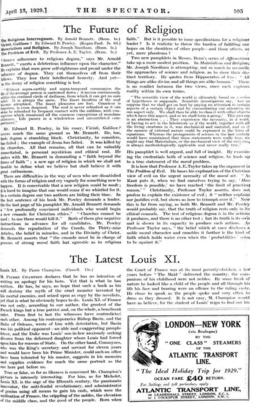The Future of Religion
't STRICT adherence to religious dogma," says Mr. Arnold Bennett, " exerts a deleterious influence upon the character." lie explains that men grow self-righteous and proud under the influence of dogma. They cut themselves off from their fellows. They lose their intellectual honesty. And yet- is the decay of religion something is lost.
" Without supra-earthly and supra-temporal communion the fife of the average person is narrowed down ; it moves continuously Within the confined circle of dailiness, from which it can get no sure relief. It is always the same. The finest faculties of the soul flecome atrophied. The finest pleasures am lost. Grandeur is forgotten, is even despised. The soul is never refreshed as it can done be refreshed by frequent contact with the sublime, with con- ceptions which transcend all the common conceptions of mundane existence. Life passes in a windowless and unventilated com- partment."
Mr. Edward B. Powley, in his essay, Vicisti, Galilace? covers much the same ground as Mr. Bennett. He, too, finds dogma a stumbling block. Christianity, he considers, lies failed ; the example of Jesus has failed. It was killed by the churches. All that remains, all that can be valuably resuscitated, is personal mysticism and ethical zeal. He Unites with Mr. Bennett in demanding a " faith beyond the forms of faith " ; a new age of religion in which we shalt not Trouble to define what we believe but shall believe it with Oat enthusiasm.
There are difficulties in the way of men who are dissatisfied With the forms of religion and cry vaguely for something new to happen. It is conceivable that a new religion could be made;. it is hard to imagine that one would come if we whistled for it. in a certain degree our two authors are biding their time. In The last sentence of his book Mr. Powley demands a leader. On the last page of his pamphlet Mr. Arnold Bennett demands few profoundly convinced individuals who would begin i new crusade for Christian ethics." " Churches cannot be used ; to use them would kill it." Both of them give negative instructions in advance for all candidates. Mr. Powley demands the repudiation of the Creeds, the Thirty-nine Articles, the belief in miracles, and in the Divinity of Christ. Mr. Bennett asserts that " the crusade must be in charge of persons of strong moral faith but agnostic as to religious
faith." But is it possible to issue specifications for a religious leader ? Is it realistic to throw the burden of fulfilling our hopes on the shoulders of other people—and those others. as. yet, mere phantoms ?
Two new pamphlets in Messrs. Benn's series of Affirmations- take up a more modest position. In Materialism and Religioq;. Mr. Joseph Needham is attempting, not so n►uc•h to reconcile the approaches of science and religion, as to show their dis- tinct territory. He quotes from Hippocrates of Cos : •• All things are alike divine and all things are alike human." Thew is no conflict between the two views, since each explores reality within its own terms.
" The scientific view of the world is ultimately based on a series of hypotheses or supposals. Scientific investigators say, ' Let us suppose that we shall get on best by paying no attention to certain aspects of a certain object and by concentrating our attention on one aspect only. We shall then be able to class it with other objects which have this aspect, and so we shall form a group.' This promos is an abstraction . . . They experience the necessity, in a word. of having to act in the laboratory as if the world, together with all the living creatures in it, was mechanical and material, and as if the essence of external nature could be expressed in the form of equations. Whereas the protagonists of science in the last century would have maintained that these statements were really true, we might say that Materialism, or the mechanical view of the universe, is always methodologically applicable and never really true."
His pamphlet is well argued, and full of insight. By examin- ing the credentials both of science and religion. he leads up to a true statement of the moral problem.
It is here that Professor A.E.Taylor takes up the argument in The Problem of Evil. He bases his explanation of the Christian view of evil on the urgent necessity of the moral act. " As Kant puts it, when we find ourselves trying to say, ' How freedom is possible,' we have reached ` the limit of practical reason.' " Christianity, Professor Taylor asserts, does not profess to explain the existence of evil ; it " neither explains. nor justifies evil, but shows us how to triumph over it." Now this is far from saying, as both Mr. Bennett and Mr. Powley would probably say, that the truth of religion rests only in its ethical counsels. The test of religious dogma is in the actions . it produces, and there is no other test ; but its truth is its own and is shown in its capacity to produce such actions. As Professor Taylor says, " the belief which at once disclosed noble moral character and ennobles it further is the kind of faith which holds water even when the probabilities see►u to be against it."


















































 Previous page
Previous page